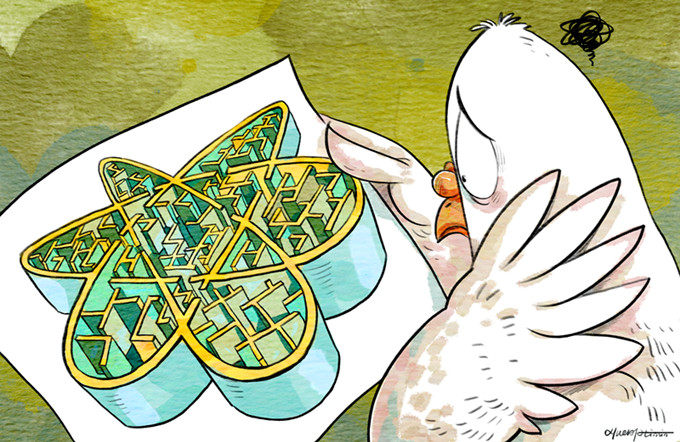Money should not rule film and TV industry
 |
|
CAI MENG/CHINA DAILY |
Content is still the king
As an associate professor and a screenwriter, the changing trend I've noticed in the film and TV industry this year is that, the strategy of investing huge amounts of money in young, popular actors and value-added (and patented) products may no longer work. That's because the market is maturing and becoming more rational both for the audiences and purchasers (and distributors) of movies and TV programs.
In the past, investors believed they could make huge profits by casting in-demand actors in and adapting popular works for their films or TV programs. And more often than not they proved right.
With capital continuing to flood the film and TV industry, the paychecks the popular actors demanded kept becoming bigger. Their rising demands were almost always met, because as long as the producers could sell their products for a profit, they had nothing to complain.
As a result, the entire industry happily bought the logic of paying fat paychecks to "bankable" actors even if that meant increasingly high production costs. This trend continued until some movies and TV shows produced following this "tried and tested" strategy bombed at the box office or were rejected by the audiences, because the "dependable" young actors performances were horrible or the storylines were weak.
The strategy of banking on celebrities, everyone has realized, is not sustainable.
TV dramas like In the Name of the People-produced at a cost of 120 million yuan ($17.43 million), of which a total of 48 million yuan was paid to experienced actors-h(huán)as set a positive example both for producers and young actors: powerful content and good acting is its winning combination.
And for us screenwriters, it's overwhelming to see society has gradually reached the consensus that "content is still the king". The lesson producers and investors who intend to step into the industry can learn from this is to not be obsessed with the popularity of stars, as great works will always lead, not follow, the trend.
Ni Jun, associate professor in the Department of Film and TV Art, the Central Academy of Drama
Stars' pay shows wealth gap
I want to emphasize at the beginning that casting young, popular actors in movies and TV programs to make maximum profits has never been a trend. At best, it might have been a temporary phenomenon, as only productions with great artistic value and solid content have been appreciated by audiences and critics both as worthy works.
People are still mourning the death of Yang Jie, the director of the TV drama Journey to the West, which was adapted from the Chinese classic of the same name. For three decades, Yang's adaptation has fascinated viewers, many of whom have watched the TV series multiple times. Since the actors and technical staff associated with Yang's production have disseminated the messages of Journey to the West, people will continue to admire it.
If producers pay fat paychecks to popular actors but only paltry amounts to lesser-known but gifted performers and screenwriters, they cannot always produce quality works. Ill-paid screenwriters will not offer good contents, and actors denied their due can walk away with shoddy performances.
The adjustment of the market can help outstanding productions and artists to make a mark in society, and the government should intervene to strike a balance between paychecks of celebrities and versatile artists. That an actor is paid 1 million yuan for appearing in just one show of a TV series only because he/she is popular signifies the failure of the market.
Since such discrepancy in payment is not limited to the film and TV industry, it could have a bearing on society as a whole, especially because many scientists and other experts endeavoring to make real contributions to humankind still don't earn enough money to lead a relatively comfortable life. Perhaps the time has come to make those celebrities who earn astronomical amounts of money pay higher rates of income tax to promote social equality.
Zhao Yunze, associate professor at the School of Journalism and Communication, Renmin University of China





















